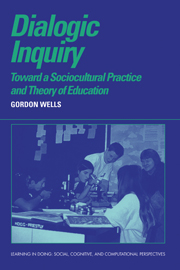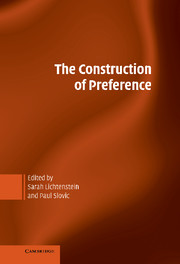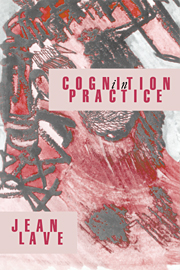Dialogic Inquiry
Towards a Socio-cultural Practice and Theory of Education
$140.00 (C)
Part of Learning in Doing: Social, Cognitive and Computational Perspectives
- Author: Gordon Wells, University of Toronto
- Date Published: August 1999
- availability: Available
- format: Hardback
- isbn: 9780521631334
$
140.00
(C)
Hardback
Other available formats:
Paperback, eBook
Looking for an examination copy?
This title is not currently available for examination. However, if you are interested in the title for your course we can consider offering an examination copy. To register your interest please contact [email protected] providing details of the course you are teaching.
-
For more than a quarter century, the polemics surrounding educational reform have centered on two points of view: those that favor a "progressive" child-centered form of education, and those that would prefer a return to a more structured, teacher-directed curriculum that emphasizes basic knowledge and skills. Vygotsky's social constructivist theory offers an alternative solution, placing stress on coconstruction of knowledge by more and less mature participants engaging in joint activity. This theory offers semiotic mediation as the primary means of obtaining knowledge, whereby the less mature participants can seek solutions to everyday problems by using resources existing in society. In addition to using illustrative examples from classroom studies, this book provides a comparative analysis of the theories and complementary developments in works by Vygotsky and the linguist M.A.K. Halliday. This unique volume will be of tremendous benefit to researchers in the fields of education, sociolinguistics, and psychology.
Read more- Offers an approach to education for a 'knowledge society'
- Author is highly visible and lectures widely
- Based on collaborative research with teachers
Reviews & endorsements
"An important contribution. . . . Dialogic Inquiry is a challenging book to read, both because it raises serious questions about many of the assumptions underlying cognitive science and because it tackles difficult theoretical questions without avoiding their complexity. . . Wells has demonstrated. . . that the sociocultural perspective has a great deal to offer our understanding of thinking, knowing, language and learning." Contemporary Psychology
Customer reviews
Not yet reviewed
Be the first to review
Review was not posted due to profanity
×Product details
- Date Published: August 1999
- format: Hardback
- isbn: 9780521631334
- length: 392 pages
- dimensions: 229 x 152 x 25 mm
- weight: 0.75kg
- contains: 7 b/w illus. 9 tables
- availability: Available
Table of Contents
Conventions of transcription
Introduction
Part I. Establishing the Theoretical Framework:
1. The complementary contributions of Halliday and Vygotsky to a 'language-based theory of learning'
2. In search of knowledge
3. Discourse and knowing in the classroom
Part II. Discourse, Learning, and Teaching:
4. Text, talk, and inquiry: schooling as semiotic apprenticeship
5. Putting a tool to different uses: a reevalution of the IRF sequence
6. From guessing to predicting: progressive discourse in the learning and teaching of science
7. Using the tool-kit of discourse in the activity of learning and teaching
8. Making meaning with text: a genetic approach to the mediating role of writing
Part III. Learning and Teaching in the ZPD:
9. On learning with and from our students
10. The zone of proximal development and its implications for learning and teaching
Appendices
References
Indexes.
Sorry, this resource is locked
Please register or sign in to request access. If you are having problems accessing these resources please email [email protected]
Register Sign in» Proceed
You are now leaving the Cambridge University Press website. Your eBook purchase and download will be completed by our partner www.ebooks.com. Please see the permission section of the www.ebooks.com catalogue page for details of the print & copy limits on our eBooks.
Continue ×Are you sure you want to delete your account?
This cannot be undone.
Thank you for your feedback which will help us improve our service.
If you requested a response, we will make sure to get back to you shortly.
×





